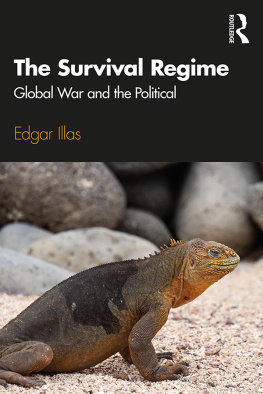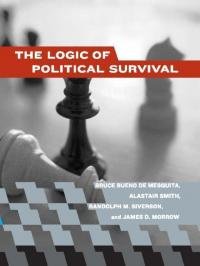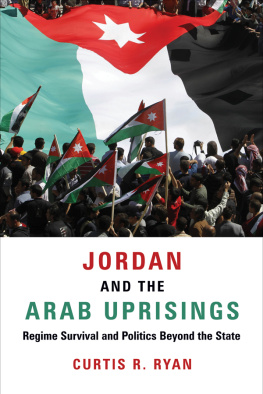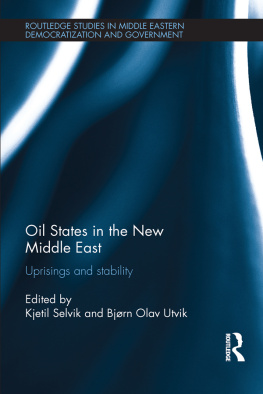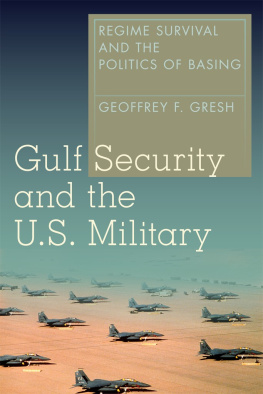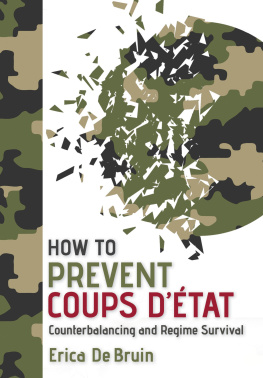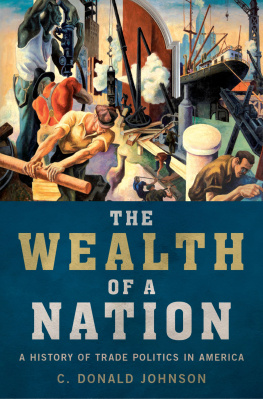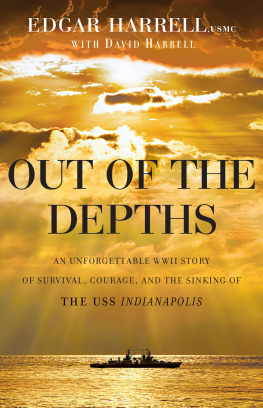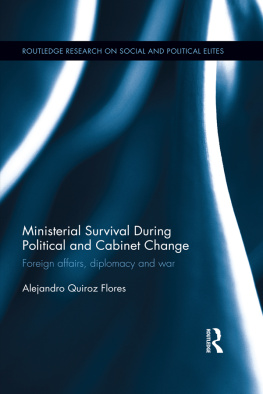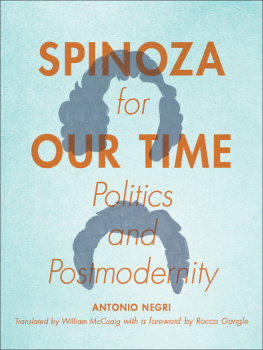THE SURVIVAL REGIME
The Survival Regime explores the concept of survival to describe the effects on politics of the fusion of war and capital in globalization. Survival defines a sort of degree zero governmentality that has resulted from the crumbling of the political and spatial architecture of modernity, particularly the state. It does not simply name the new content of all politics or the economic law of the strongest of neoliberalism. Rather, it theorizes how systemic violence and permanent instability force political life to struggle for its own existence, thus generating a regime based on productive engagement and urgent intervention.
Through a critical dialogue with various contemporary thinkers (Galli, Hardt and Negri, Esposito, Agamben, Derrida, and Schmitt, among others), Edgar Illas theorizes survival as a global logic that overcomes the links between life and power explained by the Foucauldian paradigm of biopolitics. He examines parallel notions such as singularity, aleatoriness, eclecticism, and distinction to question previous theorizations of the political based on class struggle, inclusion, hegemony, or recognition of demands.
Through the intersection of different lines of inquiry, including Marxism, war theory, biopolitics, and deconstruction, The Survival Regime contributes to the rethinking of critical theory, political theory, and cultural studies in globalization.
Edgar Illas is an associate professor of Catalan Studies in the Department of Spanish and Portuguese at Indiana University, Bloomington. He has published Thinking Barcelona: Ideologies of a Global City (2012) and various articles on Marxism, politics, and architecture.
First published 2020
by Routledge
52 Vanderbilt Avenue, New York, NY 10017
and by Routledge
2 Park Square, Milton Park, Abingdon, Oxon OX14 4RN
Routledge is an imprint of the Taylor & Francis Group, an informa business
2019 Taylor & Francis
The right of Edgar Illas to be identified as author of this work has been asserted by him in accordance with sections 77 and 78 of the Copyright, Designs and Patents Act 1988.
All rights reserved. No part of this book may be reprinted or reproduced or utilized in any form or by any electronic, mechanical, or other means, now known or hereafter invented, including photocopying and recording, or in any information storage or retrieval system, without permission in writing from the publishers.
Trademark notice: Product or corporate names may be trademarks or registered trademarks, and are used only for identification and explanation without intent to infringe.
Library of Congress Cataloging-in-Publication Data
A catalog record for this title has been requested
ISBN: 978-0-367-27943-1 (hbk)
ISBN: 978-0-367-27944-8 (pbk)
ISBN: 978-0-429-29886-8 (ebk)
I want to express my gratitude for the conversations and multiple forms of support to colleagues and friends Patrick Dove, Joan Ramon Resina, Warren Montag, Mario Santana, Ricardo Andrs Guzmn, Timothy Campbell, Adam Sitze, Ilana Gershon, Adam Morris, William Viestenz, Carl Good, Steven Wagschal, Joshua Kates, Johannes Trk, William Rasch, Kim Masoliver, Jennifer Duprey, Antonio Y. Vzquez-Arroyo, Elisa Mart-Lpez, Jonathan Risner, Nathan Douglas, Nora Gardner, Dylan Taylor, Tingting Zhang, Claudia Gonzlez Caparrs, lvaro Lpez Pajares, Guillermo Lpez-Prieto, Zachary Baker, Juan Morilla Romero, and Caitlin McClelland-Methvin. My thanks to the participants in the reading group on biopolitics at the Center for Theoretical Inquiry in the Humanities at Indiana University (IU) in the spring of 2017, and its director, Michel Chaouli. I also want to thank the students of my seminar on War and the Political in the spring of 2018. Many thanks to IUs Institute for Advanced Studies and its director, Eileen Julien, for the fellowship that allowed me to finish the book. Special thanks to Natalja Mortensen for believing in the project and for her fine editorial guidance. Thanks also to Charles Baker and Philip Parr for their editorial assistance.
Most of all, I must thank my beloved wife Maria for her unconditional love, encouragement, and patience. I dedicate this book to her and to our son Folc.
This book is a theoretical reflection on the conditions for political life in the endless wars of globalization. Specifically, I explore the notion of survival to describe the effect on politics of the fusion between global capitalism and global war. As political theorist Carlo Galli has argued, global war, which symbolically began with the attacks of September 11, 2001, constitutes a new typology of conflict that has destabilized the conceptual and spatial distinctions of modernity. Since war is no longer contained by state sovereignty, violence tends to adopt the forms of terrorism, constant combat, preemptive action, chronic threats, and a general state of exception and fear that permeates all spheres of society. Conflicts in global war naturally continue to draw in nation-states, yet their causes and effects involve multiple areas, authorities, and populations. At the same time, global war presents local and regional points of intensification, from more bellicose ones like Syria, IsraelPalestine, or the Mexican narco-wars to sites of soft violence such as Trumps anti-immigrant policy, the suffocation of dissidence in Turkey, and Spains repression of Catalan separatism. Thus, even if each conflict is singular and variable, they give rise to a global order of war that puts into permanent crisis the foundations of sovereign power. My goal here is to diagnose this crisis and to explore the political forms that have emerged beyond the state.
My point of departure is that global war and the crisis of state sovereignty correspond to a dominant logic of global capitalism. Violence has always accompanied capitalism in the systems of primitive accumulation, imperialism, and general dispossession and exploitation. However, global war defines a new moment of capitalist, and specifically financial, self-regulation through direct killing and social expulsion. Violence in previous stages of capitalism, no matter how brutal, was inscribed in a process of development and future reproduction at the national and international levels. Violence, in short, was a regrettable but necessary side-effect of progress. By contrast, in globalization violence produces sites of crisis that make possible the instant extraction of capital out of the crisis itself. Naomi Klein has termed these procedures disaster capitalism. In a contradictory way, war and destruction become inherent to the capitalist process of production, particularly to its financial system.
The fusion of global capital and war has fundamentally altered the configuration of the political. Whereas in modernity politics was confined within the limits of state sovereignty, in globalization neoliberal governance aims to control, diffuse or directly suppress political life by implementing the so-called rationality of the market. My study does not focus on the neoliberal assault on sovereignty but rather on the consolidation of a parallel governmentality that results from the need and the desire of collective bodies to engage in conflict as a strategy of survival. My claim is that global war entails a regime of survival in which politics constantly emerges through singular and urgent interventions. In this global regimea regime that, as the term indicates, is always unstable, fragmented, and contestedsingular agents are formed in reaction to imminent dangers. Hence, survival defines a type of degree zero of governmentality in which living on constitutes a central form of spatializationand de-spatializationof the polis.

